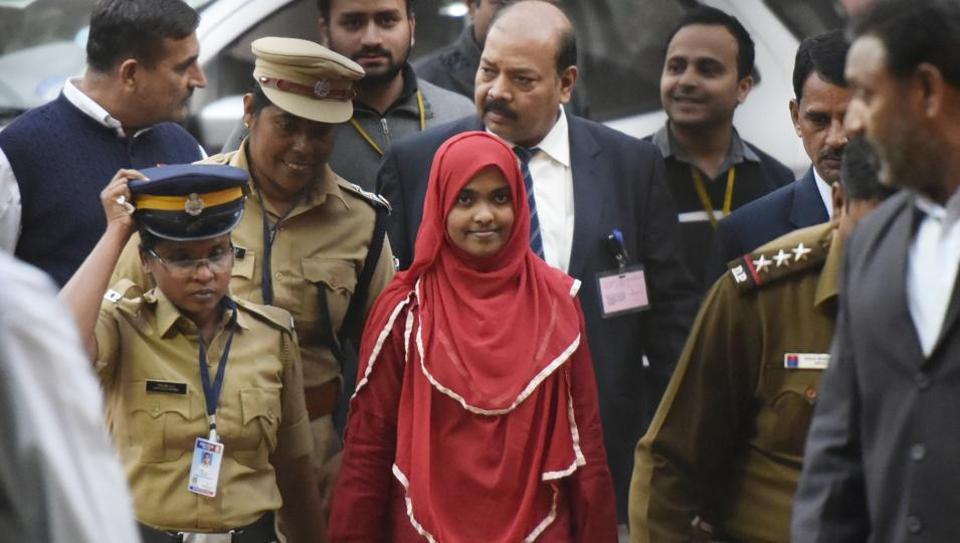Supreme Court rules on love jihad
April 14, 2018 | Expert Insights

This week, the Supreme Court ruled that a “Love Jihad” marriage overturned by the Kerala High Court was valid. The Kerala court had annulled a marriage between Hadiya Jahan and Shafin Jahan, after the former had converted to Islam to marry her husband. “Love Jihad” is a supposed strategy to convert Hindu women to Islam and radicalise them through marriage.
Background
The Democratic Republic of India has a long, multicultural history. Prior to British colonisation, the Indian subcontinent was occupied by numerous dynasties from different faiths, from the Mauryas, the Guptas, the Cholas and Pandyas, to the Delhi Sultanate and Mughal Dynasty. India was the birthplace of four major world religions: Hinduism, Jainism, Buddhism, and Sikhism. When India gained independence from British rule in the 1940s, the British facilitated the split of the Indian subcontinent on religious lines, into India, Pakistan, and East Pakistan (now Bangladesh).
A large majority of the Indian population (79.8%) is Hindu, according to the 2011 census. Muslims are a significant minority, constituting 14.2% of the population. 2.3% are Christian, 1.7% are Sikh, 0.70% Buddhist, and 0.37% Jain. Indian Muslims form the third largest Muslim population in the world (over 170 billion).
India does not have a state religion, however the constitution does not definitively separate religion from the state, differentiating it from the Western understanding of secularism. The Preamble to the Indian constitution defines India as a secular nation, which must ensure liberty of faith and worship. The right to freedom of religion is a fundamental right granted by Article 25-28 of the constitution of India. Article 25 states, “all persons are equally entitled to freedom of conscience and the right to freely profess, practice, and propagate religion subject to public order, morality and health.” The right to marry a person of one's choice is integral to Article 21 of the Constitution (The Right to Life and Personal Liberty).
However, some Indian states have what are called Freedom of Religion acts or “anti-conversion” laws. These laws have their roots in colonial times, when they were enacted by several princely states “in an attempt to preserve Hindu religious identity in the face of British missionaries.” Anti-conversion laws are in force in six states: Arunachal Pradesh, Odisha, Madhya Pradesh, Chhattisgarh, Gujarat, and Himachal Pradesh. These laws are intended to prevent religious conversion through “forcible” or “fraudulent” means, or by “allurement” or “inducement”.
In recent years, rights groups and civil society organisations have noted a rise in Hindu nationalism and extremist sentiment. Hate crimes against religious minorities, particularly Muslims, have increased in recent years.
Analysis
Extreme right-wing Hindu groups have defined “Love Jihad” as a "conspiracy to turn Hindu women from their religion by seducing them". Rakesh Sinha, member of a think tank with links to right wing Hindu organisations said, "There are certain organizations which are radicalizing youth and using love and conspiratorial marriage as a tool to attract Hindu girls… Their objective is to create disharmony and imbalance in society."
Hadiya Jahan, formerly Akhila Asokan, had her marriage to Shafin Jahan annulled by the Kerala High Court in May 2017. Asokan’s father had objected to the marriage. The National Investigation Agency (NIA) had told the Kerala court that Shafin Jahan had links to the Islamic State, and the court concluded that Hadiya had been “brainwashed”, despite her insistence that she had acted of her own free will. The court stated that “a girl aged 24 years is weak and vulnerable, capable of being exploited,” and placed her in her father’s custody.
Hadiya Jahan took the case to the Supreme Court, which enabled her to leave her father’s custody and resume her studies. On March 8th, the Supreme Court set aside the High Court verdict that had annulled Hadiya’s marriage.
On April 11th, a Supreme Court bench consisting of Chief Justice Dipak Misra, and Justices AM Khanwilkar and DY Chandrachud ruled that “The court has no right to annul marriage between consenting adults.” The court stated that Hadiya had "absolute autonomy over her person." "Choosing a faith is the substratum of individuality and sans it, the right of choice becomes a shadow," the court continued. The court added that that Hadia’s father’s objections to the marriage "cannot be allowed to curtail her fundamental rights".
"Intimacies of marriage, including the choices which individuals make on whether or not to marry and on whom to marry, lie outside the control of the state,” said the ruling. "Faith of a person is intrinsic to his/her meaningful existence. To have the freedom of faith is essential to his/her autonomy and it strengthens the core norms of the Constitution." The court allowed the NIA to continue its investigation on Shafin Jahan.
Earlier this year, the Supreme Court also issued guidelines to prevent interference in inter-religious or inter-caste marriages by Khap Panchayats. “Khap Panchayts” are self-appointed village courts that hold a significant degree of influence in many parts of rural India. They are often linked to brutal “honour killings” in the country. In March, the Supreme Court ruled that a marriage between two consenting adults cannot be stopped by these Panchayats.
Assessment
Our assessment is that with this ruling, the Supreme Court of India has adhered to the values of secularism upon which this country was founded. We believe that India is a diverse and plural society, and it is important to uphold the constitutional provisions that allow this pluralism.








Comments